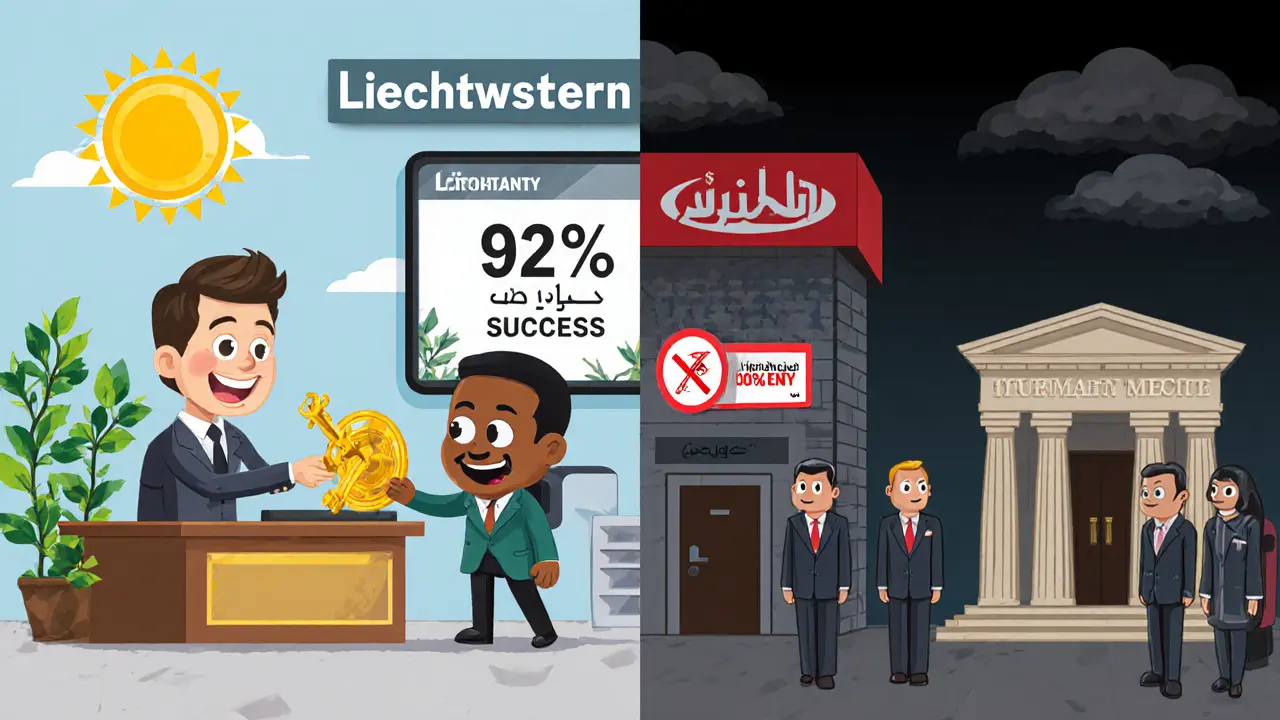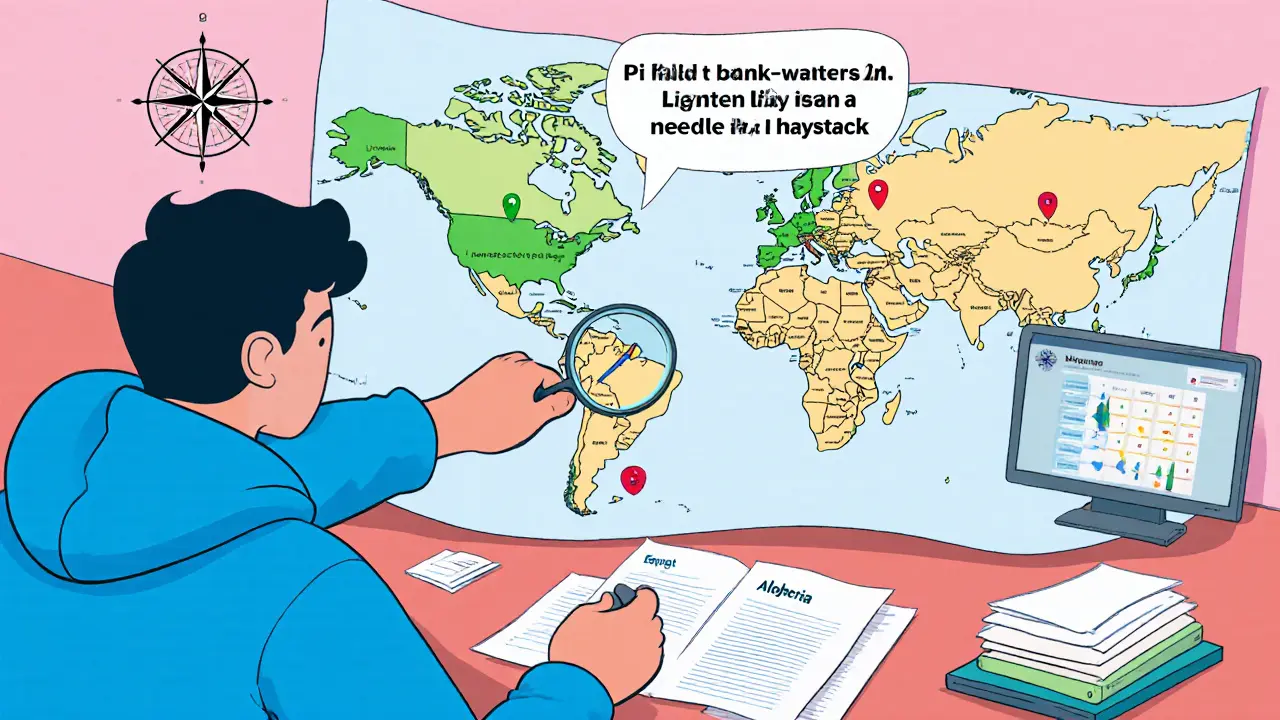Crypto Banking Country Comparison Tool
Find the best crypto banking jurisdiction for your business
Compare countries based on key metrics including banking success rate, licensing costs, and risk-weighting requirements
Crypto Banking Comparison
Finding a bank that will actually work with crypto traders feels like hunting for a needle in a haystack. Crypto Banking Access varies wildly from one jurisdiction to another, and the rules keep shifting. This guide breaks down the current landscape, shows which countries are friendlier, highlights upcoming global standards, and gives you a step‑by‑step playbook to get a business account, no matter where you are.
What Crypto Banking Access means the ability of crypto‑related businesses and individual traders to open, maintain, and use traditional bank accounts for fiat on‑ramps and off‑ramps
In simple terms, if a bank won’t let you deposit Bitcoin cash‑out proceeds or fund a crypto exchange, you’re blocked. The key drivers are:
- Local licensing requirements (e.g., Malta’s VFA licence)
- Anti‑Money‑Laundering (AML) and Counter‑Financing of Terrorism (CFT) standards
- How regulators interpret the Basel Committee’s risk‑weighting rules for crypto assets
- Political stance toward digital currencies
As of October 2025, the Atlantic Council’s tracker shows that 47 % of nations have ambiguous or outright restrictive policies, while only 28 % have clear, crypto‑friendly frameworks.
Global Snapshot: Friendly vs. Restrictive Jurisdictions
Below is a snapshot of the most permissive and the most restrictive environments, based on the Global Crypto Banking Index 2025.
| Category | Country | Legal Status of Crypto | Banking Success Rate | Typical Licensing Cost |
|---|---|---|---|---|
| Most Friendly | Liechtenstein | Legal‑tender token framework (TVTG) | 92 % | US$15‑25 k (FMA registration) |
| Most Friendly | Germany | Crypto classified as financial instruments (BaFin) | 68 % | €30‑45 k (BaFin licence) |
| Most Friendly | Malta | VFA Act - regulated crypto services | 87 % | €35‑50 k (VFA licence) |
| Restrictive | Nigeria | Complete banking ban (CBN Circular 2017) | 0 % | - |
| Restrictive | Egypt | Crypto legal but banks prohibited | 5 % | - |
| Restrictive | Algeria | Crypto illegal as payment method | 3 % | - |
Regional Deep‑Dive
Africa
Central Bank of Nigeria issued Circular BSD/FID/DIR/GEN/LAB/01/001 in 2017, banning all crypto‑related banking activities and reinforced the ban with stiff penalties in 2021. Traders there rely on peer‑to‑peer platforms, often paying 15‑20 % premiums.
In contrast, South Africa’s Reserve Bank has adopted a “guidance‑first” stance. While not a full licence regime, it allows banks to service AML‑compliant crypto entities, resulting in a 38 % banking success rate for registered exchanges.
Europe
Germany’s BaFin treats crypto as a financial instrument, enabling banks like Solaris Bank to offer full‑fledged custodial services. The process is lengthy-four months and multiple applications, as one Reddit user recounted-but the payoff is stable Euro banking.
Liechtenstein’s TVTG provides the most predictable path, with a dedicated Regulatory Laboratory that answers queries within 3.2 business days. The average onboarding time is just 2‑4 weeks.
Asia‑Pacific
Japan’s Financial Services Agency (FSA) introduced a licensing regime in 2020. Yet only 62 % of licensed exchanges have secured banking relationships, mainly due to the high risk‑weighting (1,250 %). Singapore’s MAS is even stricter, applying the same risk‑weighting, which leaves most local crypto firms without a traditional account.
Australia’s ASIC offers a sandbox and a modest DCE registration fee (AU$5‑10 k). Roughly three‑quarters of sandbox participants end up with a bank account, making it a relatively friendly environment for startups.

How to Secure a Bank Account - Step‑by‑Step Playbook
- Identify the applicable licensing regime. For Malta, apply for a VFA licence; for Liechtenstein, register with the FMA under the TVTG.
- Prepare AML/CFT documentation. Include a risk assessment, transaction monitoring plan, and KYC procedures. According to the Atlantic Council, missing AML docs cause 47 % of rejections.
- Engage a crypto‑specialized legal firm. 78 % of successful applicants used a firm charging $15‑30 k.
- Submit the banking application. Provide the licence copy, AML certificates, and a detailed business description that matches the regulator’s terminology.
- Follow up with the bank’s compliance team. Expect 2-4 weeks of back‑and‑forth in friendly jurisdictions; 6-8 months in the US.
- Test the account. Perform small fiat‑to‑crypto and crypto‑to‑fiat transfers to verify limits and monitoring rules.
Common pitfalls: vague business descriptions (29 % rejection), insufficient AML controls (47 % rejection), and applying to banks that have publicly stated no crypto policy (e.g., most Nigerian banks).
Upcoming Global Standards - The Basel Committee’s Impact
The Basel Committee on Banking Supervision (BCBS) updated its prudential treatment rules in July 2024, mandating a 1,250 % risk‑weighting for unbacked crypto assets, effective January 2026. This effectively forces banks to hold massive capital cushions, making many reluctant to serve crypto businesses.
However, regulators can apply discretion. Switzerland’s FINMA caps the weighting at 800 % for tokenised assets, while the UAE’s FSRA adopts a range of 800‑1,000 %.
What does this mean for traders?
- In BCBS‑strict jurisdictions (e.g., Singapore, Canada), expect tighter onboarding and higher fees.
- In flexible jurisdictions (Liechtenstein, Switzerland), banking access remains comparatively cheap and fast.
- Prepare for a possible “banking gap” post‑2026, where 78 % of current unregulated entities could lose banking channels.

Practical Tips & Pro‑Tips
- Stay updated on regulator announcements. A single circular can flip the entire banking landscape overnight (think Nigeria 2017).
- Leverage local crypto‑friendly fintechs. Neobanks like Revolut in the EU often have looser crypto policies than legacy banks.
- Maintain a clean personal banking record. Banks frequently flag accounts that have a history of crypto transfers, even if the user is not a business.
- Consider multi‑jurisdictional strategies. Some traders keep a primary account in Liechtenstein and a backup in Singapore for redundancy.
- Document everything. Keep copies of licences, AML certifications, and correspondence. Auditors love paper trails.
Future Outlook
By 2027, the World Economic Forum predicts a polarized market: 35 % of countries will be “crypto‑ready,” offering seamless banking integration, while 47 % maintain strict barriers. The global crypto banking services market is projected to hit $18.7 billion, with traditional banks holding 58 % of the share.
For traders, the safest bet is to anchor operations in a jurisdiction with established licensing and a proven banking track record-Liechtenstein, Germany, or Malta-while keeping an eye on emerging hubs like Panama or the UAE, which blend low tax with moderate regulatory clarity.
Frequently Asked Questions
Which country currently offers the highest chance of getting a crypto‑friendly bank account?
Liechtenstein tops the list with a 92 % success rate, thanks to its TVTG framework and the FMA’s dedicated support desk.
What is the impact of the BCBS risk‑weighting rule on crypto banking?
The 1,250 % risk‑weight forces banks to hold large capital buffers for crypto assets, making many banks reluctant to open accounts unless a regulator grants a lower weighting.
How long does it typically take to secure a bank account in the United States?
Expect 6‑8 months, largely because each state has its own rules and the FDIC now demands the same 1,250 % capital reserve for crypto‑related deposits.
Can I use a personal bank account for crypto trading?
In most friendly jurisdictions, banks will only accept a business account that’s tied to a licensed crypto entity. Personal accounts are often flagged and closed.
What are the typical costs to obtain a crypto licence for banking access?
Licensing fees vary: Malta’s VFA licence costs €35‑50 k, Liechtenstein’s TVTG registration is US$15‑25 k, and Germany’s BaFin licence ranges €30‑45 k. Legal counsel adds another $15‑30 k.
Understanding the regulatory map is the first step. With the right licence, solid AML procedures, and a clear view of upcoming BCBS rules, you can turn the banking maze into a reliable on‑ramp for your crypto trading business.

18 Comments
Derajanique Mckinney
bro this is wild 😭 i just tried opening a bank account for my crypto side hustle and got flagged for 'suspicious activity'... they asked if i was mining bitcoins in my basement 🤡
Sheetal Tolambe
This is actually super helpful! I'm from India and was terrified to even ask my bank about crypto. Knowing South Africa has a 38% success rate gives me hope. Maybe we can start a community guide for Indian traders? 😊
Pranav Shimpi
Just a heads up - the 1,250% risk weight is gonna crush small exchanges. I talked to a compliance officer at a regional bank in Mumbai and they said they're already rejecting all crypto apps unless it's a Fortune 500 firm. You need a lawyer, not a spreadsheet. And yeah, typo in my last message - meant to say 'FMA' not 'FMAA'.
james mason
Honestly, if you're not registering in Liechtenstein, you're just playing Russian roulette with your capital. I mean, really - who trusts a bank that can't even tell the difference between a blockchain and a spreadsheet? 🙄
MICHELLE SANTOYO
The real story here is that banks are scared of losing control. They don't hate crypto - they hate being irrelevant. This whole 'regulation' thing is just a power play. Wake up people.
Lena Novikova
You think Nigeria's ban is bad wait till the US starts treating crypto like heroin. FDIC just told me my personal account was flagged for 'high risk digital asset exposure'... like i'm some drug dealer with a wallet
Brian Collett
I’ve been through this. Applied in Germany. Took 5 months. BaFin asked for my grandmother’s birth certificate. But now I have a business account with Solaris and I can finally pay my devs in EUR. Worth it. Just don’t rush the AML docs.
Rosanna Gulisano
People are paying 50k just to bank crypto this is insane. You're enabling criminals. Banks should be forbidden from touching this garbage. No more crypto banking period
Clarice Coelho Marlière Arruda
Wait so if i live in the US but open a bank account in Liechtenstein can i just wire money there and call it a day? Or is that gonna get me flagged as a tax evader 🤔
Kevin Johnston
This is legit gold. Saved for my crypto startup next year. Also, if you're in the US, try Mercury or Brex - they're way more chill than Chase. 🙌
gurmukh bhambra
You think this is bad? The real truth is the IMF and World Bank are pushing this to force everyone into CBDCs. Liechtenstein? Just a front. They're all in on the digital dollar. I saw the leaked memo. It's not about banking - it's about control.
Allison Andrews
It's fascinating how we've created a system where the only way to access the traditional financial system is to surrender your autonomy to a bureaucracy that doesn't understand the technology you're using. We're not just fighting banks - we're fighting the philosophy of control.
Wayne Overton
The real issue is personal accounts. Banks close them for crypto transfers even if you're not a business. My aunt got her checking account shut down for sending ETH to Coinbase. She's 72. Just wanted to buy some Dogecoin for her grandkid. Sad.
Alisa Rosner
OMG YES!! I used Revolut last year and they let me deposit from Binance!! 🎉 I had to send them 12 pages of docs but they approved it in 3 days! Also, don't forget to use a VPN when applying from the US - they flag your IP if you're in a 'high-risk' state!! 😅
Olav Hans-Ols
I used to be super skeptical but after seeing how Liechtenstein handles onboarding - 2 weeks, clear rules, actual humans answering emails - I changed my mind. Maybe regulation doesn't have to be evil. Maybe it can be helpful. Just needs to be smart.
Anna Mitchell
This is such a clear guide. I'm sharing it with my crypto club at the community college. We're all just students trying to learn. Thanks for making it feel possible.
Frech Patz
The Basel Committee's 1,250% risk weighting is a regulatory overreach disguised as prudence. It ignores the risk-adjusted volatility of tokenized assets, conflating speculative volatility with systemic risk. A more granular approach - perhaps tiered by asset backing, liquidity, and chain maturity - would be economically rational. The current framework is not risk management; it is institutional inertia.
Sunny Kashyap
India should ban this whole thing. Why are we letting foreigners make our banks do this? We have our own problems. Let them handle their own crypto mess.